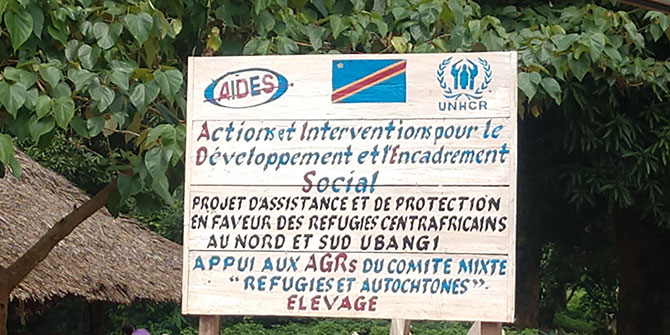As cryptocurrencies such as bitcoin gain importance in the economic lives of African societies, Daivi Rodima-Taylor and Malcolm Campbell-Verduyn explore the implications of this revolutionary financial technology on African countries.
Overlooked in much of the recent reporting on the coup in Zimbabwe were the crowds of Zimbabweans, not only cheering on the departure of Robert Mugabe, but also queuing to buy and transfer currency via Bitcoin. Across Africa, and indeed around the world, individuals are turning to Bitcoin and competing cryptocurrencies not only for questionable forms of financial speculation and illicit exchange, but also for more useful aims, such as the transfer of value across borders or facilitating novel crowdfunding and trade platforms.
Contrary to popular perceptions of the continent in much of the world, Africa is at the forefront of innovation in digital finance. Electronic transfer of value via SMS messages – mobile money – has exploded across the continent. New multimedia platforms and social networks are facilitating communication and providing insurance, health, and education services. Bitcoin and blockchain, the digital ledger technology underlying cryptocurrencies, are frequently said to be at the forefront of technological wave sweeping value exchange across the continent.
Techno-utopian and techno-dystopian accounts tend to dominate analysis of the implications posed by advent of blockchain technologies for cross-border value exchange. On the one hand, donor foundations, politicians, and international organisations all praise the blockchain technology underlying Bitcoin for potentially enabling individuals to bypass existing financial infrastructures that have tended to restrict access by charging exorbitant fees, while also being engulfed in repeated bouts of inflation and instability. On the other hand, some scholars and researchers suggest that Bitcoin and its underlying blockchain technology may extend the longstanding pathologies associated with ‘financial inclusion’ rather than addressing inequalities entrenched in market-based social relations.
How can we navigate between the promises and perils that cryptocurrencies and blockchains pose for Africans? Dichotomous perspectives on the implications of these digital technologies for African livelihoods, innovation, and financial access are invariably underlined by questions of power, distribution and equality. While technical accounts have tended to dominate academic analysis of Bitcoin, a range of social scientists have begun foregrounding the broader social, economic, and political implications of this technological ‘revolution’. Our recently published volume ‘Bitcoin and Beyond’ assembles an interdisciplinary group of scholars who assess the wider socio-economic implications of cryptocurrencies and blockchains through a shared focus on governance. In illustrating varied forms of formal governance of cryptocurrencies by governments and international organisations, as well as informal governance by the computer codes underlying cryptocurrencies along with governance through blockchains the volume provides more nuanced insights into highly dichotomised pessimistic and optimistic accounts of the promises and perils of blockchains and cryptocurrencies, for Africans as well as citizens around the world.
Promises of Cheap and Secure Value Exchange
 Cryptocurrencies facilitate direct and transparent cross-border transfers that, theoretically at least, eliminate established intermediaries such as banks and money transfer firms like Western Union. Digital currencies such as Bitcoin appear particularly suitable for migrant workers’ remittances that are relatively small in size, and have a potential to bring down exorbitant remittance transfer costs. Bitcoin and its competitors are immutable and time-stamped public ledgers that provide permanent records of exchange. This means that their transactions cannot be tampered with by any single entity such as a corrupt government or abusive firm. Rather, all transactions must be verified throughout the digital community of users.
Cryptocurrencies facilitate direct and transparent cross-border transfers that, theoretically at least, eliminate established intermediaries such as banks and money transfer firms like Western Union. Digital currencies such as Bitcoin appear particularly suitable for migrant workers’ remittances that are relatively small in size, and have a potential to bring down exorbitant remittance transfer costs. Bitcoin and its competitors are immutable and time-stamped public ledgers that provide permanent records of exchange. This means that their transactions cannot be tampered with by any single entity such as a corrupt government or abusive firm. Rather, all transactions must be verified throughout the digital community of users.
In strengthening individual autonomy while fostering new peer-based digital communities across borders cryptocurrencies can provide both material and social value. Like mobile moneys in use throughout Africa, cryptocurrencies can amplify and transform existing reciprocal networks of person-to-person transfers and exchange. In East Africa, these digital infrastructures link into existing cycles and networks of reciprocity, integrating elements from formal and informal financial sectors. The digital innovation ecosystems that emerge around mobile and cryptocurrencies in Africa build on local knowledge, cultural monetary practices and customary kin and community values.
Throughout Africa, institutions and networks of mutuality are increasingly combining the peer-oriented and egalitarian dimensions of blockchains with new forms of individual advancement. The promises to advance novel forms of individual autonomy within cross-border peer-based digital communities, however, are continually confronted with real-world socio-economic hurdles.
The Perils of ‘Disruption’
The success of cross-border crypto-remittance transfers depends on both ‘first mile’ outlets or online services where senders deposit their remittances, as well as the ‘last mile’ payout partners that include diverse local cash pickup outlets, often part of another small business or trade store. Interfacing with existing money delivery pathways – retail stores, remittance couriers, and increasingly, mobile money networks – is crucial to the success of cross-border crypto-remittances. Yet existing monopolistic delivery markets – such as M-Pesa mobile money infrastructures in Kenya – often have little incentives to include crypto-startups in their activities. As such, most of existing remittance corridors in Africa utilise bitcoin only as a ‘middle’ currency to facilitate instant settlement and avoid going through the established international wire transfer system.
The development of sustainable local blockchain-based remittance ecosystems is also hampered by digital divides across a continent where, despite recent growth, basic Internet access and smartphone/computer ownership are often beyond the exigencies of daily survival. Who actually benefits and is empowered from this revolutionary technology is further put into question by the primary use and value-added production of Bitcoin by ‘mining conglomerates’ based outside the continent.
The Roles of Governance and Need for Nuance
Exploring the roles of governance by computer codes underlying cryptocurrencies, as well as formal governance of cryptocurrencies by governments and international organisations yields more nuanced understanding of the implications for Africans of experiments in harnessing this technology for cross-border remittances. Examining the ideas and ideologies underlying blockchains reveals how its users are positioned in market-based relations. This informal governance by computer code developed in cryptocommunities with strong libertarian leanings often, but not always, stand in tension with the formal state and inter-state governance of value exchange across borders. Despite the rhetoric of ‘disruption’, novel blockchain experiments are embedded in and can sustain existing regulatory institutions and practices.
Understanding the interplay between forms of formal and informal ordering, as well as how individuals and other non-state actors such as multinational firms and NGOs exercise novel forms of governance through technologies like blockchains, will continue to be key for conceptualising the actual rather than theoretical promises and perils of this revolutionary financial technology in Africa.
For further discussion of digital remittance pathways in Africa, see Rodima-Taylor, Daivi and William Grimes, 2018, Cryptocurrencies and Digital Payment Rails in Networked Global Governance: Perspectives on Inclusion and Innovation, in Malcolm Campbell-Verduyn, ed., Bitcoin and Beyond: Cryptocurrencies, Blockchains and Global Governance. New York: Routledge.
Daivi Rodima-Taylor (@DaiviRTaylor) is lecturer and research associate at the Pardee School of Global Studies, Boston University
Malcolm Campbell-Verduyn (@MalcolmCV) is lecturer at the Department of Political Science, University of Toronto
The views expressed in this post are those of the author and in no way reflect those of the Africa at LSE blog or the London School of Economics and Political Science.






